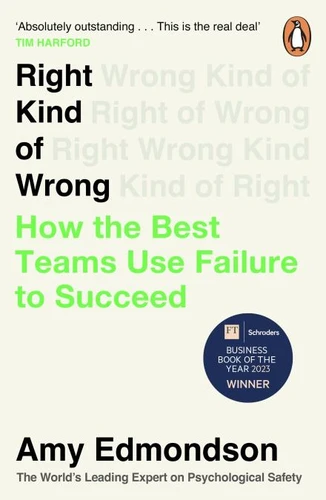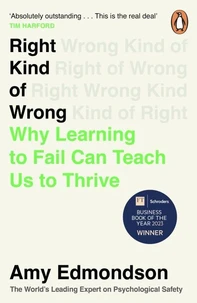Right Kind of Wrong. How the Best Teams Use Failure to Succeed
Par :Formats :
Disponible dans votre compte client Decitre ou Furet du Nord dès validation de votre commande. Le format ePub protégé est :
- Compatible avec une lecture sur My Vivlio (smartphone, tablette, ordinateur)
- Compatible avec une lecture sur liseuses Vivlio
- Pour les liseuses autres que Vivlio, vous devez utiliser le logiciel Adobe Digital Edition. Non compatible avec la lecture sur les liseuses Kindle, Remarkable et Sony
- Non compatible avec un achat hors France métropolitaine
 , qui est-ce ?
, qui est-ce ?Notre partenaire de plateforme de lecture numérique où vous retrouverez l'ensemble de vos ebooks gratuitement
Pour en savoir plus sur nos ebooks, consultez notre aide en ligne ici
- Nombre de pages368
- FormatePub
- ISBN978-1-5291-6061-1
- EAN9781529160611
- Date de parution07/09/2023
- Copier Coller02 page(s) autorisée(s)
- Protection num.Adobe DRM
- Infos supplémentairesepub
- ÉditeurPenguin
Résumé
Winner of the Financial Times Business Book of the Year Award'Absolutely outstanding' Tim Harford, author of The Undercover Economist'A masterclass' Angela Duckworth, author of Grit'Excellent' Andrew Hill, Financial TimesWe used to think of failure as a problem, to be avoided at all costs. Now, we're often told that failure is desirable - that we must 'fail fast, fail often'. The trouble is, neither approach distinguishes the good failures from the bad.
As a result, we miss the opportunity to fail well. Here, Amy Edmondson - the world's most influential organisational psychologist - reveals how we get failure wrong, and how to get it right. Drawing on four decades of research into the world's most effective teams, she unveils the three archetypes of failure - basic, complex and intelligent - and explains how to harness the revolutionary potential of the good ones (and eliminate the bad).
Along the way, she poses a simple, provocative question: What if it is only by learning to fail that we can hope to truly succeed?'Lays out a clearer path about how to stop avoiding failure and take smarter risks.' Books of the Year, Financial Times
As a result, we miss the opportunity to fail well. Here, Amy Edmondson - the world's most influential organisational psychologist - reveals how we get failure wrong, and how to get it right. Drawing on four decades of research into the world's most effective teams, she unveils the three archetypes of failure - basic, complex and intelligent - and explains how to harness the revolutionary potential of the good ones (and eliminate the bad).
Along the way, she poses a simple, provocative question: What if it is only by learning to fail that we can hope to truly succeed?'Lays out a clearer path about how to stop avoiding failure and take smarter risks.' Books of the Year, Financial Times
Winner of the Financial Times Business Book of the Year Award'Absolutely outstanding' Tim Harford, author of The Undercover Economist'A masterclass' Angela Duckworth, author of Grit'Excellent' Andrew Hill, Financial TimesWe used to think of failure as a problem, to be avoided at all costs. Now, we're often told that failure is desirable - that we must 'fail fast, fail often'. The trouble is, neither approach distinguishes the good failures from the bad.
As a result, we miss the opportunity to fail well. Here, Amy Edmondson - the world's most influential organisational psychologist - reveals how we get failure wrong, and how to get it right. Drawing on four decades of research into the world's most effective teams, she unveils the three archetypes of failure - basic, complex and intelligent - and explains how to harness the revolutionary potential of the good ones (and eliminate the bad).
Along the way, she poses a simple, provocative question: What if it is only by learning to fail that we can hope to truly succeed?'Lays out a clearer path about how to stop avoiding failure and take smarter risks.' Books of the Year, Financial Times
As a result, we miss the opportunity to fail well. Here, Amy Edmondson - the world's most influential organisational psychologist - reveals how we get failure wrong, and how to get it right. Drawing on four decades of research into the world's most effective teams, she unveils the three archetypes of failure - basic, complex and intelligent - and explains how to harness the revolutionary potential of the good ones (and eliminate the bad).
Along the way, she poses a simple, provocative question: What if it is only by learning to fail that we can hope to truly succeed?'Lays out a clearer path about how to stop avoiding failure and take smarter risks.' Books of the Year, Financial Times








